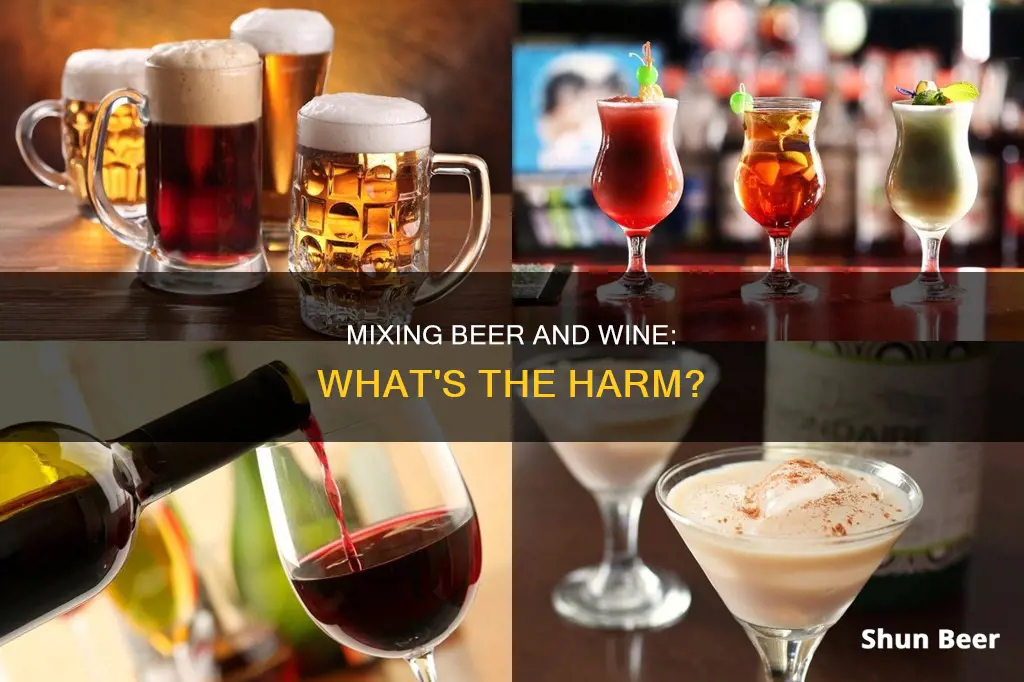
Beer before wine and you'll feel fine; wine before beer and you'll feel queer is a well-known saying that has been tested by researchers at Witten/Herdecke University in Germany and the University of Cambridge in the UK. The study found that the order in which you drink wine and beer does not affect the severity of a hangover. Instead, the best predictors of a bad hangover are how drunk you feel and whether you vomit after drinking.
| Characteristics | Values |
|---|---|
| Can drinking wine and beer at the same time cause a bad hangover? | A study by the University of Cambridge found that drinking wine and beer in either order does not affect the severity of a hangover. The best predictor of a bad hangover is how drunk the drinker felt or whether they vomited after drinking. |
| Is it dangerous to drink wine and beer at the same time? | Drinking wine and beer at the same time is not dangerous to health, but it is still important to drink responsibly and never drive under the influence. |
What You'll Learn
- Beer and wine can be mixed without causing worse hangovers than drinking just one or the other
- Drinking beer and wine together may make you feel less drunk than you are, leading to drinking more
- The saying beer before wine and you'll feel fine is just an old wives' tale
- The best predictor of a bad hangover is how drunk you feel or if you vomit after drinking
- The only reliable way to avoid a hangover is to drink responsibly

Beer and wine can be mixed without causing worse hangovers than drinking just one or the other
There is a common belief that drinking beer and wine together will result in a worse hangover than drinking just one or the other. However, studies have found that this is not true. A study conducted by researchers at Witten/Herdecke University in Germany and the University of Cambridge in the UK found that the order in which one consumes beer and wine does not affect the severity of a hangover. The study involved 90 participants who were divided into three groups and consumed varying amounts of beer and wine. The results showed that the order of consumption had no significant impact on the hangover scores, and the main predictors of a bad hangover were how drunk the participants felt and whether they vomited.
Another study by Mythbusters also came to a similar conclusion. They found that the rate of consumption, rather than the order, was the determining factor in the severity of a hangover. Additionally, they discovered that a hangover caused by mixing beer and liquor was less severe than a hangover caused by beer alone.
While some people believe that drinking beer and wine together will make the hangover worse, these beliefs are often based on personal anecdotes or cultural sayings rather than scientific evidence. For example, there is a saying in the US that goes, "beer before liquor, never been sicker; liquor before beer, you're in the clear." Similarly, in Belgium, the saying is, "wijn na bier is plezier en bier na wijn is venijn," which advises drinking beer before wine to avoid feeling sick.
However, it is important to note that mixing different types of alcohol can lead to consuming more alcohol than intended. This is because drinking different types of alcohol can make it difficult to keep track of how much one has consumed, increasing the risk of overconsumption and, consequently, a worse hangover. Therefore, while mixing beer and wine may not inherently cause a worse hangover, it is crucial to monitor one's overall alcohol intake to avoid negative consequences.
Beer and Chemo: What's Safe to Drink?
You may want to see also

Drinking beer and wine together may make you feel less drunk than you are, leading to drinking more
Mixing beer and wine will not cause a hangover. This is a myth with no basis in reality. However, mixing the two can make you feel as if you haven't had as much to drink as you have, which may lead to drinking more.
This is because liquor, wine, and beer are typically consumed at different rates. Drinking the strong stuff too quickly can lead to a hangover. Drinking beer after wine may make you feel less thirsty, so you're less likely to drink water before bed, which can also contribute to a hangover.
The best predictor of a bad hangover is how drunk you feel and whether you vomit after drinking. The only reliable way to avoid a hangover is to pay attention to these red flags and know when to stop drinking.
How Much Is Too Much? Drinking 12 oz Beer
You may want to see also

The saying beer before wine and you'll feel fine is just an old wives' tale
Mixing beer and wine in one sitting has long been thought to be a bad idea, with many people claiming that the order in which you consume these drinks matters. The saying "beer before wine and you'll feel fine; wine before beer and you'll feel queer" is a well-known rhyme that supposedly helps people avoid hangovers. However, this notion has been debunked by researchers, who have found that it is a myth with little truth behind it.
The idea that drinking beer after wine is detrimental gained traction due to several theories. One popular theory suggests that the carbonation in beer causes alcohol to be absorbed more quickly, leading to increased inebriation and a worse hangover. Another theory claims that drinking lighter alcohols after stronger ones is unwise, as it can lead to drinking more of the stronger alcohol without realising it. Some also believe that drinking beer after wine is unwise because wine is lighter in consistency, making it harder for the body to detoxify.
However, a 2019 study at Cambridge University set out to test these theories. Ninety volunteers between the ages of 19 and 40 were split into three groups, with the first group consuming beer followed by wine, the second group consuming wine followed by beer, and the third group consuming only one type of drink. The groups were similar in terms of gender, body size, drinking habits, and hangover frequency. The experiment was repeated a week later, with the first two groups swapping their drink orders.
The researchers found no correlation between hangover symptoms and the order in which the drinks were consumed. Instead, the best predictors of a bad hangover were how drunk the participants felt and whether they vomited after drinking. The study concluded that the total amount of alcohol consumed and how fast it is absorbed are the most important factors in determining the severity of a hangover, rather than the specific order of drinks.
So, while the saying "beer before wine and you'll feel fine" may be a catchy rhyme, it is just an old wives' tale with little scientific basis. The key to avoiding a hangover is to drink responsibly, know your limits, and pay attention to how your body is feeling.
Alcohol Neuropathy: Is Non-Alcoholic Beer Safe to Drink?
You may want to see also

The best predictor of a bad hangover is how drunk you feel or if you vomit after drinking
Drinking wine and beer at the same time may not be a good idea, as it could lead to a bad hangover. While there are many myths and old wives' tales about the order in which one should consume alcohol to avoid a hangover, the best predictor of a bad hangover is often how drunk you feel or if you vomit after drinking.
A study published by Harvard Health Publishing investigated the age-old question, "beer before wine, or wine before beer?" The study enrolled 90 adults between the ages of 19 and 40, randomly assigning them to one of three groups. The first group drank beer until their breath alcohol level reached at least 0.05%, and then drank wine to reach at least 0.11%. The second group did the opposite, starting with wine and then moving on to beer. The third group was allowed to drink either only wine or only beer to reach the higher breath alcohol level.
The groups were similar in terms of gender, body size, drinking habits, and frequency of hangovers. Hangover symptoms were assessed after each drinking session. Interestingly, the researchers found no correlation between hangover symptoms and the order in which the subjects drank wine and beer or whether they stuck to just one type of drink. The best predictors of a bad hangover were how drunk the subjects felt and whether they vomited after drinking.
This finding makes sense when we consider that alcohol is absorbed rather well and rather quickly by the body, regardless of the specific drink. However, it is worth noting that the type of alcohol and its carbonation level can affect how quickly you feel the effects. For example, beer contains a lot of CO2, which can cause the alcohol to "hit your head" much faster. Similarly, champagne has a more immediate effect due to its high carbonation and sugar content.
While drinking wine and beer at the same time may not directly cause a worse hangover, it is important to monitor your overall alcohol consumption and drink responsibly to avoid negative consequences.
Steroid Shots and Non-Alcoholic Beer: Safe Mix?
You may want to see also

The only reliable way to avoid a hangover is to drink responsibly
Mixing drinks is a common practice, and many people believe that drinking wine and beer together will result in a nasty hangover. However, the idea that mixing drinks causes worse hangovers is just a myth. A study by researchers at Witten/Herdecke University in Germany and the University of Cambridge found that drinking beer followed by wine or vice versa did not affect the severity of hangovers. The study, which included 90 volunteers, concluded that the best predictor of a bad hangover was how drunk the participants felt and whether they vomited.
While mixing drinks may not directly cause worse hangovers, it is important to remember that mixing different types of alcohol can increase the overall amount of alcohol consumed, especially when it comes to cocktails. The higher the alcohol content and the faster you drink it, the more likely you are to experience a hangover. Therefore, it is crucial to practice responsible drinking and pay attention to your body's limits.
To avoid a hangover, it is recommended to drink in moderation, stay hydrated, and consume alcohol with food. Drinking slower and having a full stomach will help your body process alcohol more effectively and reduce the risk of a hangover. Additionally, choosing drinks with lower congeners, such as beer, vodka, or wine, might also help reduce hangover symptoms compared to drinks with higher congeners like brandy, whiskey, or rum.
However, it is important to note that everyone's tolerance to alcohol is different, and individual factors such as body size, gender, and drinking habits can also influence the severity of hangovers. Ultimately, the most reliable way to avoid a hangover is to drink responsibly, listen to your body, and be mindful of your alcohol consumption.
Beer and Covid 19: What's Safe to Drink?
You may want to see also
Frequently asked questions
Yes, you can drink wine and beer at the same time. Mixing alcohol types does not cause hangovers. However, mixing can make you feel as if you haven't drunk as much as you have, which may lead to drinking more.
According to a study by the University of Cambridge, the order in which you drink beer and wine does not affect the severity of your hangover. The best predictors of a bad hangover are how drunk you feel and whether you vomit after drinking.
It is important to drink responsibly and know when to quit. To avoid a hangover, pay attention to how drunk you feel and whether you are sick. Make sure to drink water before going to bed, as alcohol can be dehydrating.







